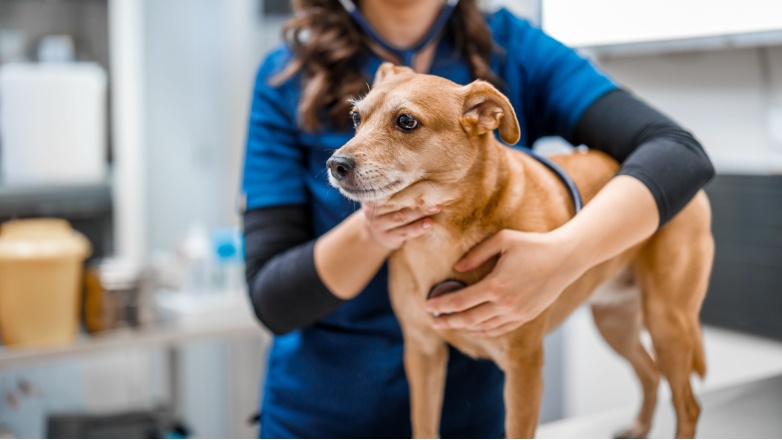Understanding Cushing’s Disease in Dogs: Symptoms, Treatment & Management

Cushing’s Disease is a common endocrine disorder in middle-aged to older dogs, yet it’s often misunderstood. If you’ve noticed your pup drinking more water, urinating frequently, or losing fur without an apparent reason, it might be time to consider whether Cushing’s could be the cause. Let’s dive into what this condition really is, how to recognise it, and what you can do to help your furry friend live a happy, healthy life.
🧠 What is Cushing’s Disease in Dogs?
Cushing’s Disease, formally known as hyperadrenocorticism, occurs when a dog’s body produces too much cortisol, a hormone responsible for managing stress, metabolism, and immune response. While cortisol is essential in moderation, excess levels can wreak havoc on a dog’s body over time.
There are three primary types of Cushing’s Disease in dogs:
-
Pituitary-dependent Cushing’s (PDH)
-
The most common form (about 85-90% of cases), caused by a benign tumor on the pituitary gland which overstimulates the adrenal glands.
-
-
Adrenal-dependent Cushing’s (ADH)
-
Less common, caused by a tumor on one of the adrenal glands.
-
-
Iatrogenic Cushing’s
-
Caused by prolonged use of corticosteroid medications.
-
🔍 Clinical Signs and Symptoms
Because the symptoms can be subtle or mistaken for aging, Cushing’s often goes undiagnosed in its early stages. Here are the most common signs:
- Increased thirst and urination
- Increased appetite
- Excessive panting
- Hair loss (especially on the body, with head and legs spared)
- Pot-bellied appearance
- Thinning skin and easy bruising
- Lethargy or reduced activity
- Muscle weakness
- Recurring skin infections
🧪 Diagnosing Cushing’s Disease
Diagnosis can be a bit tricky and usually involves a combination of:
- Physical exam
- Blood work (CBC, chemistry panel)
- Urinalysis
- Specific hormone tests like:
- Low-dose dexamethasone suppression (LDDS) test
- ACTH stimulation test
- Abdominal ultrasound (to assess adrenal glands)

💊 Treatment Options
Treatment depends on the type and severity of the disease.
- Medications
- The most common and effective drugs include:
- Trilostane – Suppresses cortisol production; widely used and FDA-approved.
- Mitotane – Destroys parts of the adrenal cortex; used less frequently due to potential side effects.
- The most common and effective drugs include:
- Surgery
- If the disease is adrenal-dependent, surgical removal of the adrenal tumor might be an option, although it’s more invasive and riskier, especially for older dogs.
- Discontinuing Steroids
- If Cushing’s is iatrogenic (caused by steroid medications), gradual withdrawal under veterinary supervision may resolve the condition.
🛡️ Prevention and Management
Unfortunately, there’s no guaranteed way to prevent naturally occurring Cushing’s. But you can help your dog by being proactive with health and wellness.
✅ Management Tips:
- Regular vet visits – Especially as your dog gets older.
- Monitor for early signs – Don’t dismiss increased drinking or urination.
- Routine bloodwork – Catch hormonal imbalances early.
- Weight management – Keep your dog at a healthy weight to reduce strain on organs.
- Medication monitoring – If on long-term corticosteroids, follow vet guidance closely.
Once diagnosed, dogs with Cushing’s can live a good quality life with proper treatment and monitoring. Medication may need adjustments over time, and regular follow-ups will be necessary to ensure hormone levels remain balanced.
🐾 Final Thoughts
Cushing’s Disease can sound scary, but with today’s veterinary advancements, it’s a manageable condition. If your dog is showing any signs or behaviours that seem “off”, trust your instincts and don’t hesitate to contact Clyde Veterinary Hospital for a proper diagnosis and treatment plan. Catching Cushing’s early can make a huge difference in your dog’s comfort and longevity.
Your pup might have a few more vet visits ahead, but with the right care, they can still enjoy belly rubs, walks in the park, and a whole lot of tail wags.
Book an Appointment Today
Whether you’re looking for advice, reassurance, or a little extra guidance, the Clyde Veterinary Team is here to support you and your furry family members every step of the way. Reach out to us for expert care tailored to keep your pets happy, healthy, and thriving.
About the Author:
Dr. Irene Mitry is the owner and founder of Clyde Veterinary Hospital, and a vet with a difference. She has not one, but two veterinary degrees, and an abiding passion for preventative pet care. Her life-long love for our animal friends shines through in everything she does, as her client testimonials show. Dr Mitry’s long-standing desire to bring this philosophy of care to life in her own purpose-built veterinary clinic led her to found Clyde Veterinary Hospital in 2018.


